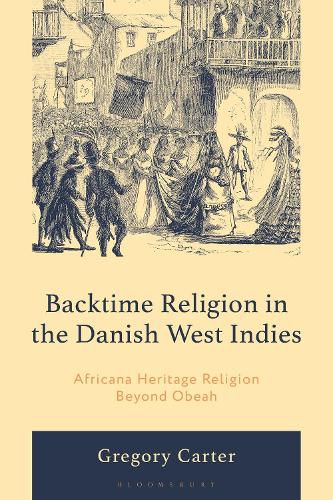Readings Newsletter
Become a Readings Member to make your shopping experience even easier.
Sign in or sign up for free!
You’re not far away from qualifying for FREE standard shipping within Australia
You’ve qualified for FREE standard shipping within Australia
The cart is loading…






During the era of slavery in the Danish West Indies, a distinct Africana heritage religion was developed by the enslaved population that relied on performative expression, and Gregory Carter traces this heritage.
This spiritualty shared many attributes with other African heritage religions throughout the African Atlantic, including belief in spirit powers, the veneration of ancestors, polyrhythmic music, dance, costumed masquerade performance, reliance on herbalism and spirit mediumship. Simultaneously, they also incorporated Evangelical Lutheran/Moravian Christianity and the practice of altaration. Backtime Religion in the Danish West Indies: Africana Heritage Religion Beyond Obeah contends that the altaration of the human body is key to conceptualizing how enslaved Africans and their descendants contended with the terrible conditions inherent to slavery, the dislocation of spiritual connections from Africa, and built a renewed and living spiritual understanding on the Danish islands. To prevent loss of cultural knowledge and spirituality, the Danish West Indian enslaved community adapted to life on the islands with immediate pragmatism and took in every available means to regain connection to spiritual power available, containing and hiding this spirituality within living human bodies. Through in-depth research, Carter provides insight into how this religious practice, African heritage, and culture continue to impact the present-day Virgin Islands.
$9.00 standard shipping within Australia
FREE standard shipping within Australia for orders over $100.00
Express & International shipping calculated at checkout
During the era of slavery in the Danish West Indies, a distinct Africana heritage religion was developed by the enslaved population that relied on performative expression, and Gregory Carter traces this heritage.
This spiritualty shared many attributes with other African heritage religions throughout the African Atlantic, including belief in spirit powers, the veneration of ancestors, polyrhythmic music, dance, costumed masquerade performance, reliance on herbalism and spirit mediumship. Simultaneously, they also incorporated Evangelical Lutheran/Moravian Christianity and the practice of altaration. Backtime Religion in the Danish West Indies: Africana Heritage Religion Beyond Obeah contends that the altaration of the human body is key to conceptualizing how enslaved Africans and their descendants contended with the terrible conditions inherent to slavery, the dislocation of spiritual connections from Africa, and built a renewed and living spiritual understanding on the Danish islands. To prevent loss of cultural knowledge and spirituality, the Danish West Indian enslaved community adapted to life on the islands with immediate pragmatism and took in every available means to regain connection to spiritual power available, containing and hiding this spirituality within living human bodies. Through in-depth research, Carter provides insight into how this religious practice, African heritage, and culture continue to impact the present-day Virgin Islands.